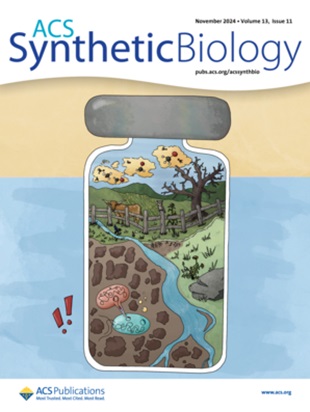Regulatory Components for Bacterial Cell-Free Systems Engineering.
IF 3.9
2区 生物学
Q1 BIOCHEMICAL RESEARCH METHODS
引用次数: 0
Abstract
Cell-free systems are advancing synthetic biology through fast prototyping and modularity. Complex regulatory networks can now be implemented in cell-free systems enabling various applications, such as diagnostic tool development, gene circuit prototyping, and metabolic engineering. As functional complexity increases, the need for regulatory components also grows. This review provides a comprehensive overview of native as well as engineered regulatory components and their use in bacterial cell-free systems.
无细胞细菌系统工程的监管组件。
无细胞系统通过快速原型和模块化推动了合成生物学的发展。现在,复杂的调控网络可以在无细胞系统中实现,使诊断工具开发、基因回路原型设计和代谢工程等各种应用成为可能。随着功能复杂性的增加,对调控元件的需求也与日俱增。本综述全面概述了原生和工程调控元件及其在无细胞细菌系统中的应用。
本文章由计算机程序翻译,如有差异,请以英文原文为准。
求助全文
约1分钟内获得全文
求助全文
来源期刊
CiteScore
8.00
自引率
10.60%
发文量
380
审稿时长
6-12 weeks
期刊介绍:
The journal is particularly interested in studies on the design and synthesis of new genetic circuits and gene products; computational methods in the design of systems; and integrative applied approaches to understanding disease and metabolism.
Topics may include, but are not limited to:
Design and optimization of genetic systems
Genetic circuit design and their principles for their organization into programs
Computational methods to aid the design of genetic systems
Experimental methods to quantify genetic parts, circuits, and metabolic fluxes
Genetic parts libraries: their creation, analysis, and ontological representation
Protein engineering including computational design
Metabolic engineering and cellular manufacturing, including biomass conversion
Natural product access, engineering, and production
Creative and innovative applications of cellular programming
Medical applications, tissue engineering, and the programming of therapeutic cells
Minimal cell design and construction
Genomics and genome replacement strategies
Viral engineering
Automated and robotic assembly platforms for synthetic biology
DNA synthesis methodologies
Metagenomics and synthetic metagenomic analysis
Bioinformatics applied to gene discovery, chemoinformatics, and pathway construction
Gene optimization
Methods for genome-scale measurements of transcription and metabolomics
Systems biology and methods to integrate multiple data sources
in vitro and cell-free synthetic biology and molecular programming
Nucleic acid engineering.

 求助内容:
求助内容: 应助结果提醒方式:
应助结果提醒方式:


